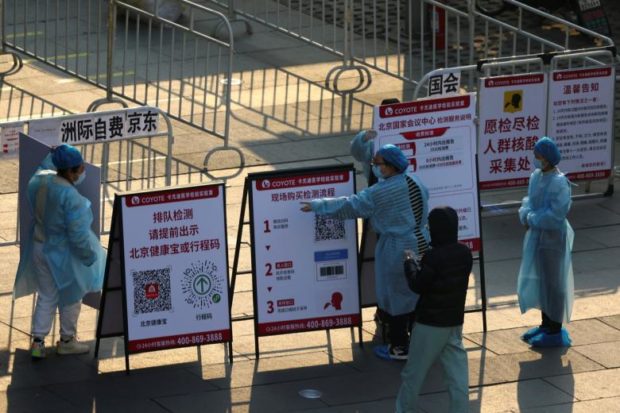Another year of restricted travel for China

China is firmly sticking to its ‘zero Covid’ policy as the country moves into its third year of dealing with the pandemic. PHOTO: REUTERS
BEIJING – Insurance agent Yuan Jiahui will once again spend the Chinese New Year apart from her extended family.
Travel restrictions ordered by her husband’s employer and children’s school mean that they could be penalized for having a family member who has traveled out of Beijing.
“I don’t want to affect their work and schooling, so it’s a sacrifice I have to make, even though my parents live just two hours away from Beijing,” she told The Straits Times.
“I haven’t seen them in almost three years.”
As China moves into its third year of the pandemic, it is firmly sticking to its zero-Covid-19 policy, ordering lockdowns and mass testing in a bid to completely eliminate the virus.
READ: China detects more Omicron cases as cities tighten restrictions
With the Chinese New Year travel season fast approaching, the government is actively discouraging people from traveling during a festival celebrating reunions and togetherness.
While some have bristled against the seemingly never-ending restrictions, most are resigned to this being a way of life, while transport operators are bracing themselves for another year of slimmer takings.
This year’s holiday travel season lasts 40 days between Jan 17 and Feb 25, a period known as the world’s largest human migration. Chinese New Year falls on Feb 1 this year.
Ticket sales for buses and trains started on Jan 3 but have been met with a lukewarm reception, particular those leaving Beijing.
As China battles its largest Covid-19 outbreak since the initial flare-up in Wuhan, companies are discouraging unnecessary travel in case staff get caught up in sudden lockdowns or worse, fall sick.
China’s commitment to a zero-Covid-19 policy means that anyone deemed a close contact, or even to have visited a high- or medium-risk area can face quarantine in a centralized facility.
With Beijing set to host the Winter Olympics, which starts on Feb 4, the capital is on high alert, making it mandatory for anyone entering the city to undergo Covid-19 testing and allowing only fully vaccinated individuals in for certain events.
According to a government notice issued on Thursday (Jan 6), travel operators have been reminded to enforce mandatory mask wearing on public transportation, while tourist sites have been told to restrict the number of daily visitors.
Private driver Hu Wei, 46, who manages a fleet of cars and mini vans, said bookings are about 30 per cent less this year.
“Previously, we will be fully booked a month before the Spring Festival, but this year, everyone wants to wait and see if the situation improves,” he said.
“They’re village people who don’t like the city, so going to visit them is the only way.
“Yet, if I go, my husband and children might get penalized. But all these measures, what is the purpose and when will it end?” she said.
In other cities such as Wuhan, restrictions are more relaxed.
Madam Wang Jing, who runs a Cantonese restaurant in the central Chinese city, has already bought her ticket home.
“There’s nothing stopping me from leaving or coming back, of course I want to spend time with my family,” the 67-year-old Guangzhou native said.
“I’m already so old, what’s there to be afraid of?”